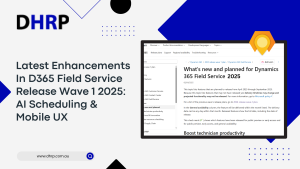The construction sector is rapidly evolving as a result of technical advancements, and enterprise resource planning (ERP) solutions are becoming more and more crucial to this transformation. ERP software systems facilitate decision-making, streamline business operations, and enhance project management. With various options available on the market, selecting the most cutting-edge and modern ERP system for your construction company may be challenging.
In this article, we’ll look at 8 important factors you should consider when selecting a cutting-edge ERP system for your construction-related organization. So buckle up and prepare to make a decision that will alter how your construction firm runs.

What Is an Enterprise Resource Planning System?
ERP, or enterprise resource planning, solutions address crucial business functions such as supply chain management, accounting, procurement, project management, service management, manufacturing, sales, and compliance.
Due to the extent to which they impact various facets of supply chain operations, ERP systems historically tended to be used mainly by the manufacturing and distribution industries. These solutions, which also include features specific to each industry, were developed from several supply chain applications to meet the broader accounting and financial needs of all firms.

How Does Erp Help The Construction Industry?
ERP solutions help the construction industry and offer a variety of solutions that help by streamlining projects and ensuring compliance with regulations and standards.
- Streamlines project management by providing a centralized planning, scheduling, budgeting, and monitoring platform.
- Optimizes resource management through real-time tracking and scheduling of equipment, materials, and labor.
- Enhances financial management with tools for accounting, budgeting, and reporting.
- Improves supply chain efficiency with real-time visibility into inventory levels, procurement, and logistics.
- Ensures compliance with regulations and standards through tracking and reporting tools.
How Construction Companies Can Benefit from a Modern ERP System
The construction industry is complex and constantly evolving, with many different components and stakeholders involved in each project. Construction companies can benefit from implementing an enterprise resource planning (ERP) system to manage these complexities and ensure project success. How?
Here are the benefits of ERP:
- ERP solutions use three critical tools to support accounting and administration teams: document and asset management.
- Optical Character Recognition (OCR) technology automates data extraction from documents and images, reducing data entry time and minimizing errors.
- Integrating OCR technology into ERP solutions can recognize attached invoices and create AP invoices with a single click.
- Look for OCR solutions with approval logic, workflows, and automation designed to fit your business requirements.
- Trade portals give stakeholders access to a secure online location for flexible, interactive, real-time communication, simplifying communication and minimizing the risk of missing important information.
- Implement best practices for user access to reduce system security risks and keep confidential information secure.
- Application Programming Interfaces (APIs) enhance the use of ERP software by allowing different applications to interact with each other.
- APIs ensure that ERP solutions are easily accessible to other applications and systems while also helping to export data to a few other platforms, such as business intelligence services.
8 Things to Consider When Choosing an ERP for Construction
Is Dynamics 365 good for construction? Well, this is why most people are moving to it. While you are selecting ERP for construction, here are 8 things you need to consider.
Choose ERP system features based on your immediate and future business needs. Prioritize features that align with these needs and introduce them gradually to facilitate training. Work with your solution provider to add new features over time. Determine which features you require to conduct a targeted search for suitable software, as not all construction ERPs offer the same features and capabilities.
Maximize your ERP investment by setting up dependencies within the system to ensure proper resource allocation and order of operations throughout the project management lifecycle. Before investing in construction ERP software, identify and define project dependencies to set up your system according to specific business requirements and achieve efficient implementation.
ERP systems fall into three categories:
- Tier 1 for large construction firms with complex global processes and budgets, taking a year or more to implement.
- Tier 2 for mid-size companies with simpler processes, costing less than Tier 1 and taking up to a year to implement.
- Tier 3 for small or niche construction businesses, with short implementation timelines of a few months and the most affordable option. Choose the appropriate tier of ERP solution based on your company’s size, budget, and process complexity to ensure your needs are met.
To choose the appropriate ERP system, you must decide whether to opt for a horizontal or vertical solution. Horizontal ERP systems are general platforms designed for various industries, while vertical ERP systems support specific industries or verticals.
Vertical ERP systems offer more specialized features, such as project bid management and mobile timekeeping, while horizontal ERP systems have broader functionality and are more sophisticated. Some solution providers aim to combine both types by providing a horizontal ERP and collaborating with partners to deliver construction-specific capabilities.
When implementing an ERP for construction, solution providers typically offer either an on-premise or cloud-based deployment option.
- On-premise deployments involve purchasing a software license for each user and installing the software onto your company’s servers, offering greater control over data and connectivity but higher maintenance costs and security responsibilities.
- In contrast, cloud-based deployments involve paying a subscription fee to access the ERP. It is about storing data in the cloud and allowing access from anywhere with an internet connection. Moreover, it provides lower IT costs, easy upgrades, and scalability.
Good ERP integrations are vital for seamless information exchange between different systems, providing a comprehensive view of your construction organization. When evaluating ERP solutions, check if the vendors have pre-built connections with other platforms in your software ecosystem. If not, ask if they can create custom integrations.
Clarify your goals and refine your search for ERP solutions by determining your construction firm’s desired future state – the ideal outcome after implementing the new system.
The choice of solution provider is as crucial as the ERP system itself. Some providers follow a standardized implementation approach and disengage after the system goes live. If you need a more collaborative partner to tailor your solution and drive innovation, such providers may not be the best fit.
Use Case:
Pacific HVAC
Pacific HVAC needed an ERP system to manage orders within a timeframe and create a challenging work environment. After six months of research, they chose Microsoft Dynamics 365 for construction, with modules for finance, supply chain, production, project management, and manufacturing processes. They partnered with DHRP to implement the system successfully, which improved their business processes, managed finances and operations, and sped up production.

Bottom Line
You no longer have to wonder about the question; can dynamics 365 be used for project management? As the answer is obvious.
In brief, choosing the right modern ERP system is crucial for efficient business operations in the construction industry. Key factors include customization, integration, scalability, security, mobility, analytics, user-friendliness, and vendor support. Successful implementation can lead to increased productivity, better decision-making, and improved customer satisfaction.
So, if you don’t want any hassle, let the team of DHRP help you with it.





































































































